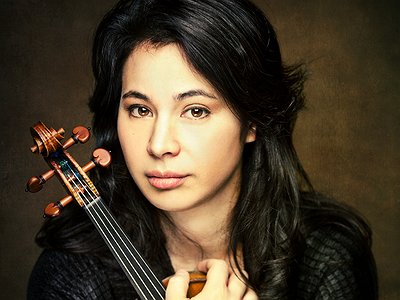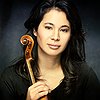Part 1.
Name: Mirijam Contzen
Nationality: German-Japanese
Occupation: violinist / artistic manager at Chamber Music Festival Schloss Cappenberg / teacher at Universität der Künste Berlin
Bands & Projects: Serafino String Quartett / 10 year jubilee of Chamber Music Festival Schloss Cappenberg 2015
Labels: Oehms, ClassicClips ARTE NOVA/BMG
Musical Recommendations: Tibor Varga, Ferenc Fricsay
When did you start playing your instrument, and what or who were your early passions and influences?
I got my first violin when I was 2 years old. My mom is a violinist, too, and as a small child I remember her practicing every day for many hours. I loved to be around her, listening to the beautiful violin sound. Also my elder brother was playing violin and viola. So there was music in every corner of the house. My first violin teacher was fantastic with kids. We were a big family of pupils, going together on little concert tours with our own ensemble. It was great! When I heard the recordings of my teacher Tibor Varga for the first time, I was about 7 years old. This sound became a passion and a magnet to music for me.
How would you describe the relationship with your instrument?
The violin is my voice.
What do you personally consider to be incisive moments in your artistic work and/or career?
Every concert, every rehearsal, every interaction with musical partners is such a moment. As a player and also as a listener. Every note that I hear has an influence.
What are currently your main artistic challenges, including questions of technique relating to your instrument? In how much does this technique allow you to bring out the essence of a piece with more clarity?
As a child, you learn how to hold your instrument, you learn how to move your left fingers through technical exercises that train muscles in the right way, you learn how to play in the most “economic” way in order to be able to stay relaxed, even when you play the most challenging works. Today, I play scales to keep in shape and some exercises to warm up.
Every note needs its own very specific “technique or execution”, and the work at home is always around this question: How do I achieve giving to every note the shape that I hear within me. The challenge is to find a new way every day and not to rely on habits.
What do you start with when working on a new piece?
The first interest goes to the historic context of a work.
There's a wide range of nuances between trying to stick as closely to the score as possible and the kind of freedom Glenn Gould would indulge in. How do you balance your personal emotions and ideas with the intentions of the composer in your interpretations?
The magic about art is its freedom. And the wonderful thing within this freedom is that a musical work becomes new every time that it is played.
As a musician, you give the composer's idea a voice. You have to find out what his intentions are but at the same time the work cannot sound and live without its interpreter. In this sense, you have to be centred and authentic in order to make this process possible.
I think Glenn Gould achieved this freedom, because he stuck so closely to the score. It’s like learning a language: the better you learn the grammatical rules and vocabulary, the more you feel free to speak.
Do you feel it important that an audience is able to deduct the processes and ideas behind a work purely on the basis of the music? If so, how do you make them transparent? Do you, in general, feel that, as part of your work, music needs to be explained or should it retain its “inexplicable nature”?
I had a very interesting experience: I sat in a concert with a friend and we didn’t have an evening programme. We were listening to the premiere of a contemporary piece.
Not knowing, what the title was, our idea of the piece was the complete opposite of what the theme actually was. But I think, it depends on the piece. There are compositions, where I think it is important to explain to the listener beforehand, others should not be explained.
In how much, do you feel, are creative decisions shaped by cultural differences – and in how much, vice versa, is the perception of music influenced by cultural differences?
Cultural differences are a motor in every aspect of life ... Something that causes interesting friction and as a result, always makes a change to encounters.






